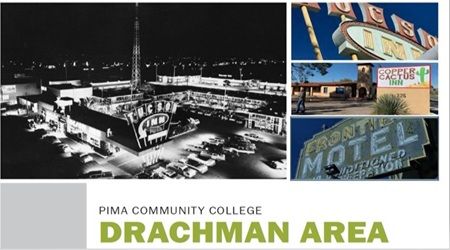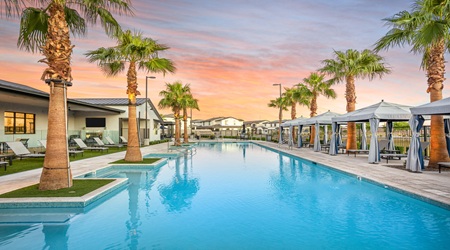PCC to Demolish 3 Historic Miracle Mile hotels after legal challenge gets blocked

TUCSON, AZ (April 10, 2025) — Pima Community College has begun to demolish three historic hotels on the Miracle Mile corridor near downtown Tucson after a panel of judges denied efforts to block the project.
In an opinion released April 4, the state court of appeals upheld a Pima County Superior Court judge’s ruling and allowed the college to proceed with the demolition.
The college bought the three historic hotels on Drachman Street between 2018 and 2019 for $3.5 million. Tucson Inn, the Frontier Motel, and Copper Cactus Inn, formerly the El Rancho Motor Hotel, are adjacent to the college’s downtown campus.
The school began searching mid-2024 for potential developers to turn the buildings into student housing. The college authorized one developer to submit a proposal that included restoring the hotels. However, the college changed course in November 2024 when its governing board voted to demolish the hotels.
After hearing oral arguments on Dec.19, 2024, the superior court denied the request for a preliminary injunction but issued a temporary restraining order to allow the historic preservation groups to appeal. The restraining order prevented the demolition, but allowed the buildings to be abated, a process that removes hazardous or contaminated materials.
The court of appeals upheld that decision, ruling that the state laws governing preservation of historic properties controlled by state agencies do not apply to the college.
“We further conclude that Petitioners cannot establish either a strong likelihood of success on the merits or that irreparable harm will result if a stay is not granted,” Judge Peter Eckerstrom said in the appeals court opinion.
“The superior court did not abuse its discretion in denying Petitioners’ request for a stay pending appeal or the underlying request for a preliminary injunction, the denial of which is the subject of that appeal.”
The college said it is pleased with the Court of Appeals decision, which allows it to address “long-standing safety and security concerns at the site and continue to focus our efforts on serving students and the broader community.”
The college said preliminary work for demolition has begun, and the college will begin considering how to use the property.
Pima Community College faced backlash for demolition
The Tucson Preservation Foundation argued that saving the buildings from demolition would help preserve Tucson’s heritage and support revitalizing the historic neighborhood. The group said the buildings “hold significant cultural and architectural value” and “represent different eras in Tucson’s history and contribute to the city’s identity.”
Members of the public on the other side of the debate argued the college was not in the business of historic preservation.
The neighborhood’s history goes back to its heyday in the 1960s, when it was a popular stop for travelers driving across the country. The Miracle Mile strip was the perfect spot to pass through, connecting the city to Routes 80 and 89 and Arizona State Route 84.
Motels for fatigued travelers flourished in the area, as did hundreds of other businesses. The location was known for its billboards and story-high neon signs.
The decline of Miracle Mile started after Interstate 10 was added as the main entry into the city. With many off-ramps, drivers began to circumvent Miracle Mile, leading to the decline of the neighborhood’s economy. Eventually, many businesses and motels were demolished, while other buildings in the area were modified.
Reach the reporter at sarah.lapidus@gannett.com . The Republic’s coverage of southern Arizona is funded, in part, with a grant from Report for America.
This article originally appeared on Arizona Republic: Tucson college to demolish 3 historic Miracle Mile hotels after legal challenge blocked

